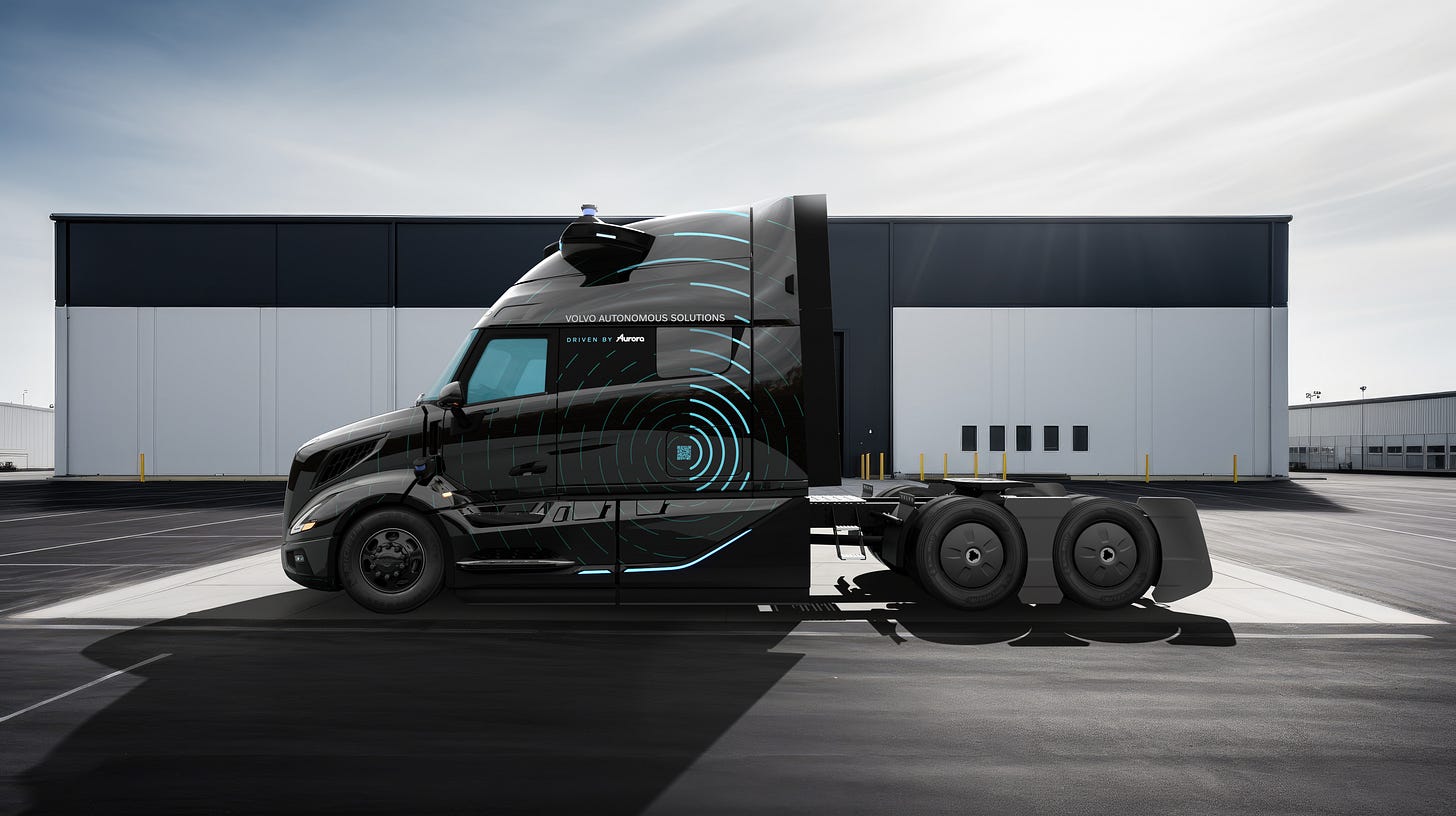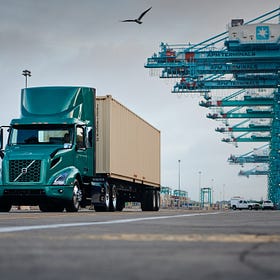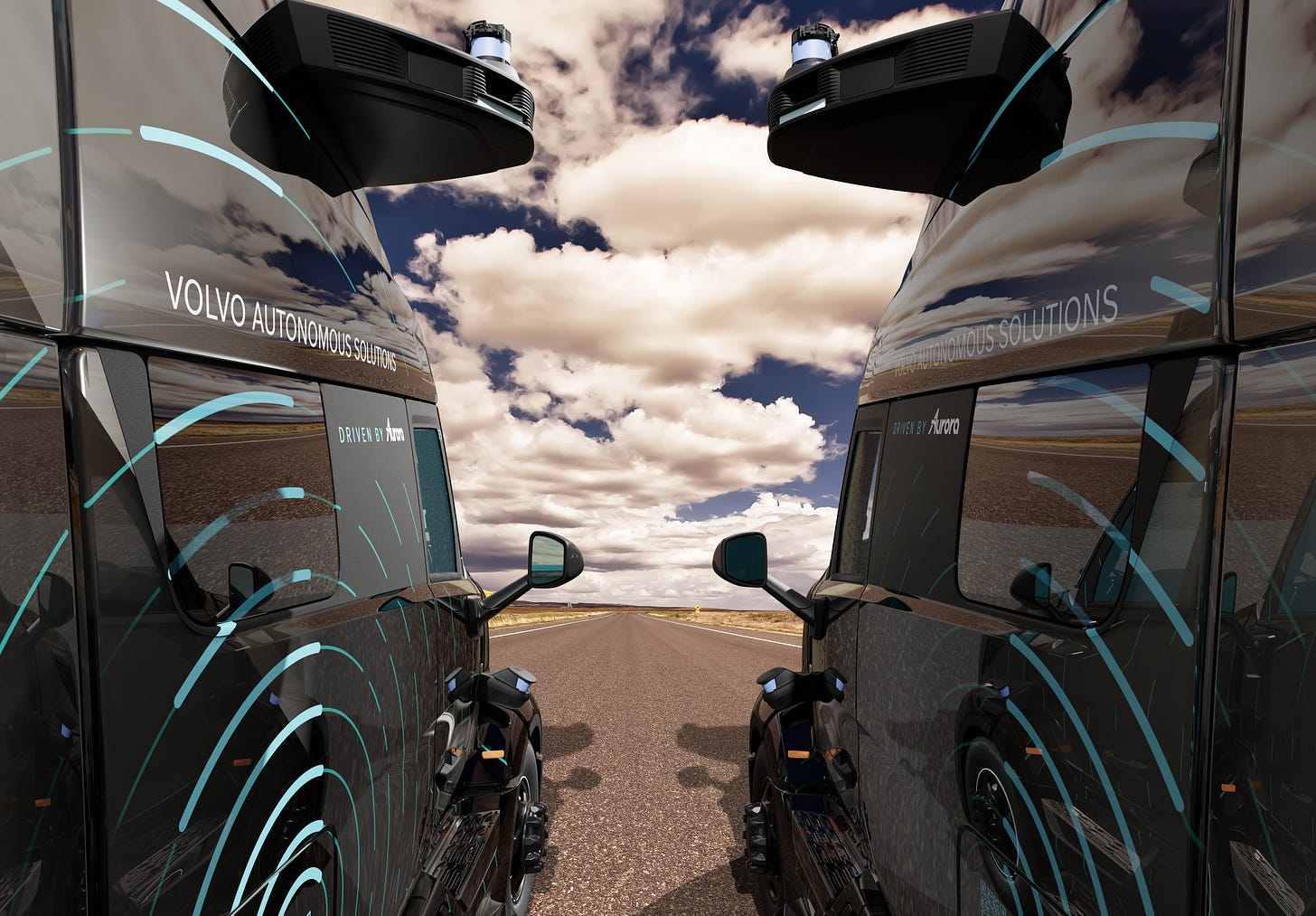Eastbound and down: Self-driving big rigs are here
Volvo Trucks and Aurora partner up on the VNL Autonomous truck
For the last decade, it has felt like fully autonomous cars have been about five years away. Today, it often still feels like they are five years away, but every once in a while, we get a big step forward to remind us that this technology actually is progressing.
Today, it comes from Aurora — an autonomous tech company co-founded by Sterling Anderson, who used to run Tesla's self-driving team.
For years, Aurora has been quietly working on a self-driving tractor-trailer platform that could revolutionize how cargo is moved around the country. Through partnerships with companies like FedEx and Schneider, Aurora-powered trucks have been driving themselves all over Texas, moving actual real-world cargo, completely autonomously (albeit with a safety driver behind the wheel).
Aside from the "easy" problems of ensuring a truck weighing 80,000 pounds stays in its lane and doesn't hit the car in front of it, the Aurora team has also been solving more complex issues like when and how to pull over to the side of the road safely without causing problems with the shoulder, how to deal with highway construction, or how to handle being pulled over by law enforcement.
Many of these are truck-specific challenges, but all must be overcome to deliver a final, commercial-ready product. That product is about to arrive.
The new Volvo VNL Autonomous takes the proven flagship of Volvo Trucks (the company no longer has any connection to the Chinese-owned Swedish carmaker, but kept the name after a corporate split) and equips it with a full suite of Aurora tech and software.
The end result is a Transport-as-a-Service model that will allow customers to buy autonomous cargo movement rather than purchasing a truck outright. Instead of needing to provide its own employees to drive the rig, FedEx will pay an all-in-one price that includes the software, support, and technology needed to make the VNL Autonomous work.
Volvo VNR Electric Big Rig Review
DUBLIN, Va. — At first glance, driving the electric Volvo VNR regional big rig truck is the same as driving the internal-combustion version: release the yellow parking brake (whipshhhhhhhhhh), shift to Drive, and set off. I tested the new electric VNR at the Volvo Trucks factory in Virginia, where it's made on the same line as i…
It's designed for hub-to-hub traffic, running from, say, a Houston FedEx warehouse to another FedEx facility in Dallas and back again. Companies might run dozens of these routes every day, moving freight around in predictable ways — something perfect for an autonomous system to handle. The routes would be easily mapped, and, perhaps more crucially, as warehouses are typically located close to major interstates, the trucks wouldn't need to navigate much by way of surface streets.
The Aurora Driver, the name for its self-driving platform, is an amalgamation of redundant computers, cameras, radar, and an in-house lidar sensor that combine to allow the Driver to navigate the world. Aurora says it has traveled 1.5 million real-world miles already, on top of many times that in simulation.
It has handled both interstates and rural highways, even operating at night and in bad weather.
While companies like Tesla get most of the attention with products like "full self-driving," outfits like Aurora (and, it must be said, Google's Waymo) have quietly been working to solve real-world problems.
Far from AI putting everyone out of a job, autonomous trucking has the potential to make a real-world impact on pricing. Freight costs — particularly labor — have a significant impact on the price of goods, and autonomous truck drivers have the potential to reduce those costs in a major way.
The announcement with Volvo brings self-driving trucks another step closer to reality. While you're right to ask questions about safety, both Aurora and Volvo are safety-obsessed and are doing everything possible to get it right.
“We built the Volvo VNL Autonomous from the ground up, integrating these redundancy systems to ensure that every safety-critical component is intentionally duplicated, thereby significantly enhancing both safety and reliability," said Shahrukh Kazmi, Chief Product Officer at Volvo Autonomous Solutions. That boring, corporatized answer basically translates to: We have two of everything — which is more than can be said for a truck being driven by a human.
The trucking industry continues to experience a shortage of drivers, and this partnership between Volvo and Aurora could help alleviate that challenge. The Volvo VNL Autonomous is built at Volvo's flagship New River Valley plant in Dublin, Virginia, on the same assembly line as the company's other VNL trucks, and the company promises to be able to meet industry demand for the vehicle.
And, if things work out like Aurora expects, there will be plenty of demand to go around.






